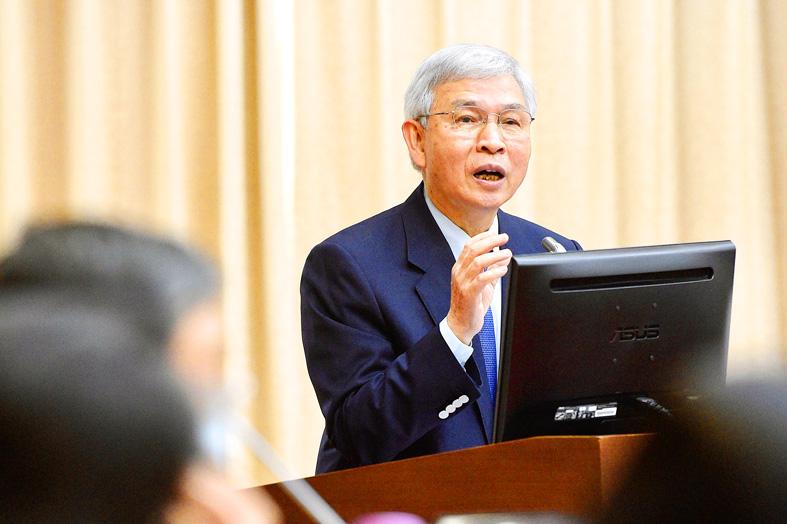Stable consumer prices, which are forecast to grow about 1.6 percent this year, indicate that Taiwan’s economy is not overheating and lend support to keeping interest rates unchanged, central bank Governor Yang Chin-long (楊金龍) said yesterday.
Yang made the remarks during a visit by lawmakers from the legislature’s Finance Committee to the central bank to inquire about monetary policy trends, and the economic outlook at home and abroad.
US Federal Reserve board members remain divided about the threat of inflationary pressures and might discuss whether to taper bond purchases during the Jackson Hole, Wyoming, economic policy symposium today, Yang added.

Photo: George Tsorng, Taipei Times
Fed members have said that US inflation of 5 percent is a temporary phenomenon to defend the bank’s money-printing policy and might hold on to current rates until early 2023, he added.
The US can invoke quantitative easing to bolster its economy, because the greenback is a major currency in which countries carry out and settle cross-border trade, Yang said.
The US dollar gains in value during bad times when investors take shelter in the currency — a tactic that other countries cannot imitate, he said.
Yang said he saw no urgency in raising interest rates in Taiwan, where inflationary pressures are mild and benign.
“Inflation sits atop the list of concerns when the central bank draws its monetary policy,” he said.
Consumer prices are expected to increase 1.6 to 1.7 percent this year, suggesting that the economy is not overheating and there is no need for sweeping tightening measures, he said.
The central bank is due to review its monetary policy next month.
Taiwan’s policy rate, currently at a record low of 1.125 percent, is not particularly loose when compared with negative interest rates in Japan and Switzerland, Yang said.
Latin American countries, such as Peru, Chile, Brazil and Mexico, have to raise interest rates to cope with imported inflation, which is not a serious issue in Taiwan, he said.
Taiwan’s economic growth, while vibrant, is largely supported by exports, which have benefited from US-China trade tensions and a severe chip shortage, Yang said.
However, domestic demand-reliant sectors have taken a hard hit from a local COVID-19 outbreak that started in May, he added.
Uneven economic growth lends support to accommodative monetary policy and the government’s plan to issue consumption vouchers to help energize domestic demand, he said.

South Korea’s equity benchmark yesterday crossed a new milestone just a month after surpassing the once-unthinkable 5,000 mark as surging global memory demand powers the country’s biggest chipmakers. The KOSPI advanced as much as 2.6 percent to a record 6,123, with Samsung Electronics Co and SK Hynix Inc each gaining more than 2 percent. With the benchmark now up 45 percent this year, South Korea’s stock market capitalization has also moved past France’s, following last month’s overtaking of Germany’s. Long overlooked by foreign funds, despite being undervalued, South Korean stocks have now emerged as clear winners in the global market. The so-called “artificial intelligence

NEW IDENTITY: Known for its software, India has expanded into hardware, with its semiconductor industry growing from US$38bn in 2023 to US$45bn to US$50bn India on Saturday inaugurated its first semiconductor assembly and test facility, a milestone in the government’s push to reduce dependence on foreign chipmakers and stake a claim in a sector dominated by China. Indian Prime Minister Narendra Modi opened US firm Micron Technology Inc’s semiconductor assembly, test and packaging unit in his home state of Gujarat, hailing the “dawn of a new era” for India’s technology ambitions. “When young Indians look back in the future, they will see this decade as the turning point in our tech future,” Modi told the event, which was broadcast on his YouTube channel. The plant would convert

‘SEISMIC SHIFT’: The researcher forecast there would be about 1.1 billion mobile shipments this year, down from 1.26 billion the prior year and erasing years of gains The global smartphone market is expected to contract 12.9 percent this year due to the unprecedented memorychip shortage, marking “a crisis like no other,” researcher International Data Corp (IDC) said. The new forecast, a dramatic revision down from earlier estimates, gives the latest accounting of the ongoing memory crunch that is affecting every corner of the electronics industry. The demand for advanced memory to power artificial intelligence (AI) tasks has drained global supply until well into next year and jeopardizes the business model of many smartphone makers. IDC forecast about 1.1 billion mobile shipments this year, down from 1.26 billion the prior

People stand in a Pokemon store in Tokyo on Thursday. One of the world highest-grossing franchises is celebrated its 30th anniversary yesterday.